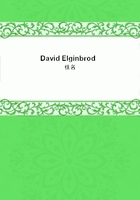
第21章
One evening in the end of summer, Hugh climbed a waste heathery hill that lay behind the house of Turriepuffit, and overlooked a great part of the neighbouring country, the peaks of some of the greatest of the Scotch mountains being visible from its top. Here he intended to wait for the sunset. He threw himself on the heather, that most delightful and luxurious of all couches, supporting the body with a kindly upholding of every part; and there he lay in the great slumberous sunlight of the late afternoon, with the blue heavens, into which he was gazing full up, closing down upon him, as the light descended the side of the sky. He fell fast asleep. If ever there be an excuse for falling asleep out of bed, surely it is when stretched at full length upon heather in bloom. When he awoke, the last of the sunset was dying away; and between him and the sunset sat Margaret, book in hand, waiting apparently for his waking. He lay still for a few minutes, to come to himself before she should see he was awake. But she rose at the moment, and drawing near very quietly, looked down upon him with her sweet sunset face, to see whether or not he was beginning to rouse, for she feared to let him lie much longer after sundown. Finding him awake, she drew back again without a word, and sat down as before with her book. At length he rose, and, approaching her, said--"Well, Margaret, what book are you at now?"
"Dr. Abercrombie, sir," replied Margaret.
"How do you like it?"
"Verra weel for some things. It makes a body think; but not a'thegither as I like to think either."It will be observed that Margaret's speech had begun to improve, that is, to be more like English.
"What is the matter with it?"
"Weel, ye see, sir, it taks a body a' to bits like, and never pits them together again. An' it seems to me that a body's min' or soul, or whatever it may be called--but it's jist a body's ain sel'--can no more be ta'en to pieces like, than you could tak' that red licht there oot o' the blue, or the haill sunset oot o' the heavens an' earth. It may be a' verra weel, Mr. Sutherland, but oh! it's no like this!"And Margaret looked around her from the hill-top, and then up into the heavens, where the stars were beginning to crack the blue with their thin, steely sparkle.
"It seems to me to tak' a' the poetry oot o' us, Mr. Sutherland.""Well, well," said Hugh, with a smile, "you must just go to Wordsworth to put it in again; or to set you again up after Dr.
Abercrombie has demolished you."
"Na, na, sir, he sanna demolish me: nor I winna trouble Mr. Wordsworth to put the poetry into me again. A' the power on earth shanna tak' that oot o' me, gin it be God's will; for it's his ain gift, Mr. Sutherland, ye ken.""Of course, of course," replied Hugh, who very likely thought this too serious a way of speaking of poetry, and therefore, perhaps, rather an irreverent way of speaking of God; for he saw neither the divine in poetry, nor the human in God. Could he be said to believe that God made man, when he did not believe that God created poetry--and yet loved it as he did? It was to him only a grand invention of humanity in its loftiest development. In this development, then, he must have considered humanity as farthest from its origin; and God as the creator of savages, caring nothing for poets or their work.
They turned, as by common consent, to go down the hill together.
"Shall I take charge of the offending volume? You will not care to finish it, I fear," said Hugh.
"No, sir, if you please. I never like to leave onything unfinished.
I'll read ilka word in't. I fancy the thing 'at sets me against it, is mostly this; that, readin' it alang wi' Euclid, I canna help aye thinkin' o' my ain min' as gin it were in some geometrical shape or ither, whiles ane an' whiles anither; and syne I try to draw lines an' separate this power frae that power, the memory frae the jeedgement, an' the imagination frae the rizzon; an' syne I try to pit them a' thegither again in their relations to ane anither. And this aye takes the shape o' some proposition or ither, generally i' the second beuk. It near-han' dazes me whiles. I fancy gin' Iunderstood the pairts o' the sphere, it would be mair to the purpose; but I wat I wish I were clear o't a'thegither."Hugh had had some experiences of a similar kind himself, though not at all to the same extent. He could therefore understand her.
"You must just try to keep the things altogether apart," said he, "and not think of the two sciences at once.""But I canna help it," she replied. "I suppose you can, sir, because ye're a man. My father can understan' things ten times better nor me an' my mother. But nae sooner do I begin to read and think about it, than up comes ane o' thae parallelograms, an' nothing will driv't oot o' my head again, but a verse or twa o' Coleridge or Wordsworth."Hugh immediately began to repeat the first poem of the latter that occurred to him:
"I wandered lonely as a cloud."